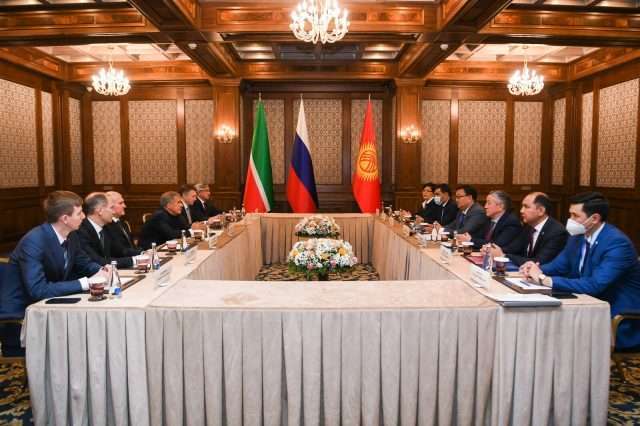Tatarstan’s role in Kyrgyz economic diversification and investments attraction

Geopolitical Report 2785-2598 Volume 13 Issue 8
Author: Giuliano Bifolchi
The recent official visit of the President of Tatarstan in Bishkek and the forum ‘Tatarstan – Kyrgyzstan’ highlighted the role that Kazan might play in supporting the Russian strategy in the Kyrgyz republic by improving economic cooperation and trade turnover.
President of Tatarstan Rustam Minnikhanov took part in the business forum ‘Tatarstan – Kyrgyzstan’ organised in Bishkek and attended by the heads of several ministries and departments, leading enterprises of the two republics.
During his speech at the forum, Minnikhanov expressed his gratitude for the attention and support for developing interregional cooperation to the President of the Russian Federation, Vladimir Vladimirovich Putin, and the President of the Kyrgyz Republic, Sadyr Nurgozhoevich Zhaparov.
The President of Tatarstan stated that the two countries need to increase their trade turnover. Minnikhanov confirmed Kazan’s interest in expanding cooperation in mechanical engineering, petrochemical products to Kyrgyzstan, agricultural machinery, compressor, refrigeration equipment, car tires, household chemical goods, halal products, and medical supplies and pharmaceutical products.
Geopolitical scenario
Kazan and Bishkek’s diplomatic and economic relations have increased in recent years. Indeed, Tatarstan and Kyrgyzstan signed an intergovernmental agreement in December 2017, and the two countries are connected by a direct flight (one flight per week from Bishkek).
At the end of 2020, the trade turnover between Tatarstan and Kyrgyzstan amounted to 41 million dollars. Tatarstan has increased its diplomatic and economic relations in Central Asia thanks to its socio-cultural and religious background and state companies specialised in oil & gas, infrastructures, agribusiness and logistics.
Kyrgyzstan has recently actively promoted its domestic market and attracted foreign direct investments (FDIs) and entrepreneurs. Bishkek has tried to exploit these benefits thanks to its logistic position in the middle of the Belt and Road Initiative, and considering that Kyrgyzstan is a member of the Eurasian Economic Union (EAEU), Bishkek has tried to exploit these benefits to attract the attention of the entrepreneurial world.
During his official visit to Istanbul, the Kyrgyz President exhorted Turkish businesspeople to invest in his country because Kyrgyzstan can become a ‘window’ on the EAEU market and the Belt and Road Initiative.
On November 12th, 2021, Prime Minister of the Republic of Kyrgyzstan Akylbek Zhaparov, during his speech at a meeting of the Commonwealth of Independent States (CIS), confirmed that Kyrgyzstan seeks to build up the transport and transit potential of the CIS countries, taking into account the interests of all member states of the Commonwealth, as well as the emerging international transport systems in terms of railway transport.
In Eurasia, Bishkek aims at strengthening economic partnerships with Iran and Pakistan. On November 12th-14th, 2021, a government delegation of the Kyrgyz Republic visited the Islamic Republic of Iran headed by the Minister of Economy and Commerce of the Kyrgyz Republic, Daniyar Amangeldiev, to discuss the issue of using the Iranian seaport of Bandar Abbas by the Kyrgyz side. On November 15th, 2021, the Ambassador of the Republic of Kyrgyzstan to Pakistan, Ulanbek Totuyaev, met with the head of the Islamabad Chamber of Commerce and Industry, Muhammad Shakil Munir, and its members within the framework of the Investor Days program. The Kyrgyz Ambassador stressed the potentiality of cooperation between the two countries’ business communities in the food, agriculture, IT, tourism, energy, pharmaceutical, and textile industries.
Bishkek looks at Europe to find new economic partners, as underlined by the recent visit of the Kyrgyz Foreign Affairs Minister to Italy and his meetings with the Italian counterpart (Italy and Kyrgyzstan strengthened their relations).
In Europe, Kyrgyzstan is also trying to attract German investments and support through the card of cultural diplomacy. On November 10th-11th, 2021, the Kyrgyz Ambassador to Germany Erlan Abdyldaev officially visited the federal state of Bavaria and met with the Bavarian State Minister for European and International Affairs Melanie Huml. The parties discussed the German humanitarian and cultural support to Kyrgyzstan and a German-Kyrbyz business forum in Bishkek in 2022.
Kyrgyzstan is also a target of the Gulf Arab monarchies. In this regard, it is possible to underline that the United Arab Emirates are interested in investing in the Central Asian republic of Kyrgyzstan by financing infrastructural, economic, energy, and social projects to become a key actor in the country (UAE Investment Interests In Kyrgyzstan).
Kyrgyzstan is financially dependent on China because more than 40% of the Kyrgyz foreign debt (1.8 billion dollars) is owed to the Export-Import Bank of China due to Chinese investments in a series of infrastructure projects the last decade. Recently, Bishkek and Beijing discussed enhancing their cooperation in the military sector to guarantee border control and security, especially after the U.S. troops withdrawal from Afghanistan and the Taliban rise to power (China and Kyrgyzstan strengthened security cooperation).
Russia considers Kyrgyzstan part of its blizhnee zarubezhe (near abroad) and lebensraum (vital space), where the Kremlin aims at strengthening its military and economic presence and political influence.
Conclusion
As observed in the Middle East (Il ruolo del Tatarstan nella politica estera russa in Iraq; The Middle Eastern expansion of Tatneft), the Republic of Tatarstan might have a significant role in promoting Kremlin’s foreign policy and strategy in Central Asia.
Kyrgyzstan needs to diversify its economic partners and decrease Bishkek’s dependence on Russian and Chinese political and economic support.
On the one hand, the Kyrgyz Government tries to attract foreign investors from Europe and Asia, promoting its logistic role connected with the EAEU and the Belt and Road Initiative. On the other hand, closer economic cooperation between Tatarstan and Kyrgyzstan might push Bishkek to be more involved in the Russian economic sphere of influence.
We can expect a major financial and political involvement of Tatarstan in Kyrgyzstan. The presence of Tatarstan’s companies and specialists in the Kyrgyz market might counterbalance the Chinese financial strategy and Western FDIs in the country.
